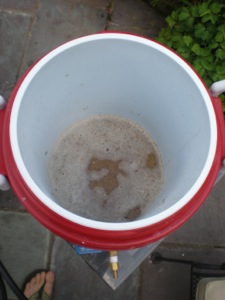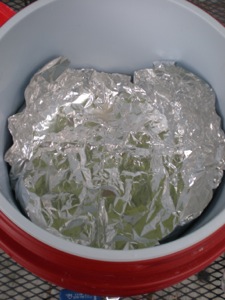I have wanted to try to make a sour or funky beer for a while. Most of the sour beer recipes in
Brewing Classic Styles and on
The Mad Fermentationist call for at least a year of aging because the "bugs" do not work as quickly as beer yeast to consume the sugars in the beer. For a number of reasons the requirement of allowing most sour beers to age for a really long time has not allowed me to brew those styles, although that has recently changed. Still, I want to try the easiest method for getting a sour beer before attempting a sour that needs to have a lengthy aging period.

With a sour mash technique to impart the requisite acidity of a
Berliner Weisse it is not necessary to store the beer a long time. As I understand it the basic idea behind the sour mash is to perform a regular mash, raise to 170F, then either 1) allow the beer to cool to between 115F - 120F or 2) sparge, collect the desired amount of wort, and cool to between 115F - 120F At that point, a handful of grain can be tossed in the mash or wort, inoculating it with
Lactobacillus bacteria that, over the course of anywhere from a few hours to a few days, will turn the wort sour. Eventually it should have a "clean" sour smell like a sourdough starter for bread. But the process is variable since you never know what "bugs" will end up in the mash. If the mash smells putrid, vomitty or fecal then something other than
Lactobacillus is present.
Once the souring is complete the wort can be boiled to kill the souring bugs and fix the level of sourness. Regular yeast can be used to ferment the remainder of the beer.
So this beer is a bit of an experiment since I might pick up some bad bugs during the sour mash. If so, I can discard the mash if it smells really terrible or see if the foul smells can be boiled away to get a cleaner beer. I would prefer to just go from grain to glass, tossing only if the end product is really terrible. At least it's a cheap recipe.
How much of the mash or wort to sour? Dave Green of
Brew Your Own recommends souring only part of it unless a very sour flavor is desired.
Brewing Classic Styles suggests that the whole wort can be soured for an assertive sourness characteristic of the style. The blog
Brain Sparging on Brewing suggests a partial sour mash unless you want the beer really sour. I did see somewhere a suggestion to sour the whole mash for a Berliner Weisse
here but some feedback on that thread indicated that the very low pH of a soured wort requires a TON of yeast to ferment properly. Well I'll pitch an entire packet of US-05. I hope that's enough.
So I've seen differences of opinions. Ten brewers, fifteen different methods....
What I will try is the full wort method, souring by tossing into the wort 4oz of grain. This is experimental. Perhaps the best way to find what works is simply to experiment, see what the results are, etc... Think of this blog entry as the notes to an experiment.
Ich bin ein Berliner Weisse
Volume: 3 gallons
2.5 lbs Belgian Pilsner
1.0 lbs Weyerman Pale Wheat
(0.25oz extra grain as an innoculant)
Mash at 149F for 75 mins, or until iodine test indicates complete conversion.
0.5 oz Hallertau pellets, 3.9%AA - 15mins - 7 IBU's
Boil Time: 15 mins
Expected OG: 1.031
Expected FG: 1.008
Expected ABV: 3.1%
Yeast: Safale US-05
------
 |
| The Mash |
7/3/12
4:12pm
Preheated cooler with 1.1 gallons brewing water at 165F or so. Dough-in when water was at 160F. Hit my mash temp almost exactly - mash was at 150F after 15mins of mash. Reserved the extra 4oz grain for later use. At 5:10pm, mash was at 148F. Started heating mash-out and sparge water.
5:25pm
Added .9 gallons of mash-out water at boiling. After a brief stir the mash was right on target at 167F - 168F. Yay!
5:35pm
Actual mash temp was 165F. Not bad. Recirculated 4 qts., collected 1.6 gallons first runnings.
5:40pm
Added sparge water at 170F. Stirred gently. Actual mash temp was 166F. Started boil of grain bag and a marble to sanitize.
5:50pm
Recirculated and collect 2nd runnings. Ended up with almost exactly 3 gallons in my bottling bucket. Cleaned out my MLT, then transferred the wort into the the cooler so that its temperature is relatively stable over the souring period. Took a small sample of wort for the hydrometer. Temperature of the wort in the cooler was 145F. Left outside without the top of the cooler. Wait for wort to cool to 125F or so before inoculating with grain.....
6:49pm
 |
| Wort plus inoculant, covered with foil. |
Wort was at about 132F. Hydrometer reading said I got 1.031 pre-boil OG. This equates to 71.8% efficiency. In the typical range of 68% - 72% when I do a batch sparge the right way.
7:03pm
Wort was at 128F. Will inoculate soon. Apparently the Lactobacillus cannot survive about 131F, but the by adding the grain the temp of the wort will drop. Still, I want to be sure that the nice little bugs survive.
7:15pm
Wort was at 128F still. Added unmashed grains to the sanitized bag with marble. Gently placed into the wort. The grains sank. Placed sanitized aluminum foil over the wort and put the top back on the cooler. Temperature reading (with sanitized thermometer) was 126F. Perfect!
Now, the suspense! Will it smell cleanly sour? Will it smell like vomit? Stay tuned......
7/4/12
10:00am
Wort was at about 100F. Smell was slightly sour but not assertively so. A few krausen bubbles had formed under the foil Taste was also a bit sour but not puckering. Actually rather pleasant - a kind of sweet and sour mix. I want a nice, assertive sourness. Pulled about two cups of wort, heated on stove to boiling, and added back. A few minutes later the temp was only 105F.
10:10am
Pull about a quart, heated to boil, added back. At 10:20am the wort was at 115F. The wort has been souring for 15 hours.
1:10pm
Wort was at 108F. Smelled cleanly sweet-sour but not strongly so.
3:00pm
Tasted a very small sample of the wort. It tasted sour to me. And smelled sour. About 20 hours after inoculation. Transferred wort to boil kettle. Wife thought it smelled sour too. Proceed as per normal brew day.....

3:45pm
Wort was around 95F when my chiller could cool it no further (at least without using a huge amount of water.) Transferred to 3-gallon better bottle, placed in basement of 67F ambient air.
8:35pm
Pitched dry yeast into 70F wort. Better Bottle was in 62F water. Followed directions on yeast packet - simply sprinkled it on top of the wort. I then shook the carboy to distribute the yeast and aerate a little bit.
7/5/12, 11am
Krausen forming. The beer is in a tub of 66F water.
7/612, 8:45am
High krausen has passed. Airlock no longer bubbling. That was a fast fermentation.
 Taste: Again, a raspberry taste dominates, but it is not as sweet as the fruit. The beer seems to have gotten more acidic, perhaps because the raspberries contribute their own share of acid but then their sugars ferment away. I wouldn't call this beer harshly acidic, but it could use a touch of sweetness or some added complexity to at least slightly balance the sourness.
Taste: Again, a raspberry taste dominates, but it is not as sweet as the fruit. The beer seems to have gotten more acidic, perhaps because the raspberries contribute their own share of acid but then their sugars ferment away. I wouldn't call this beer harshly acidic, but it could use a touch of sweetness or some added complexity to at least slightly balance the sourness.





